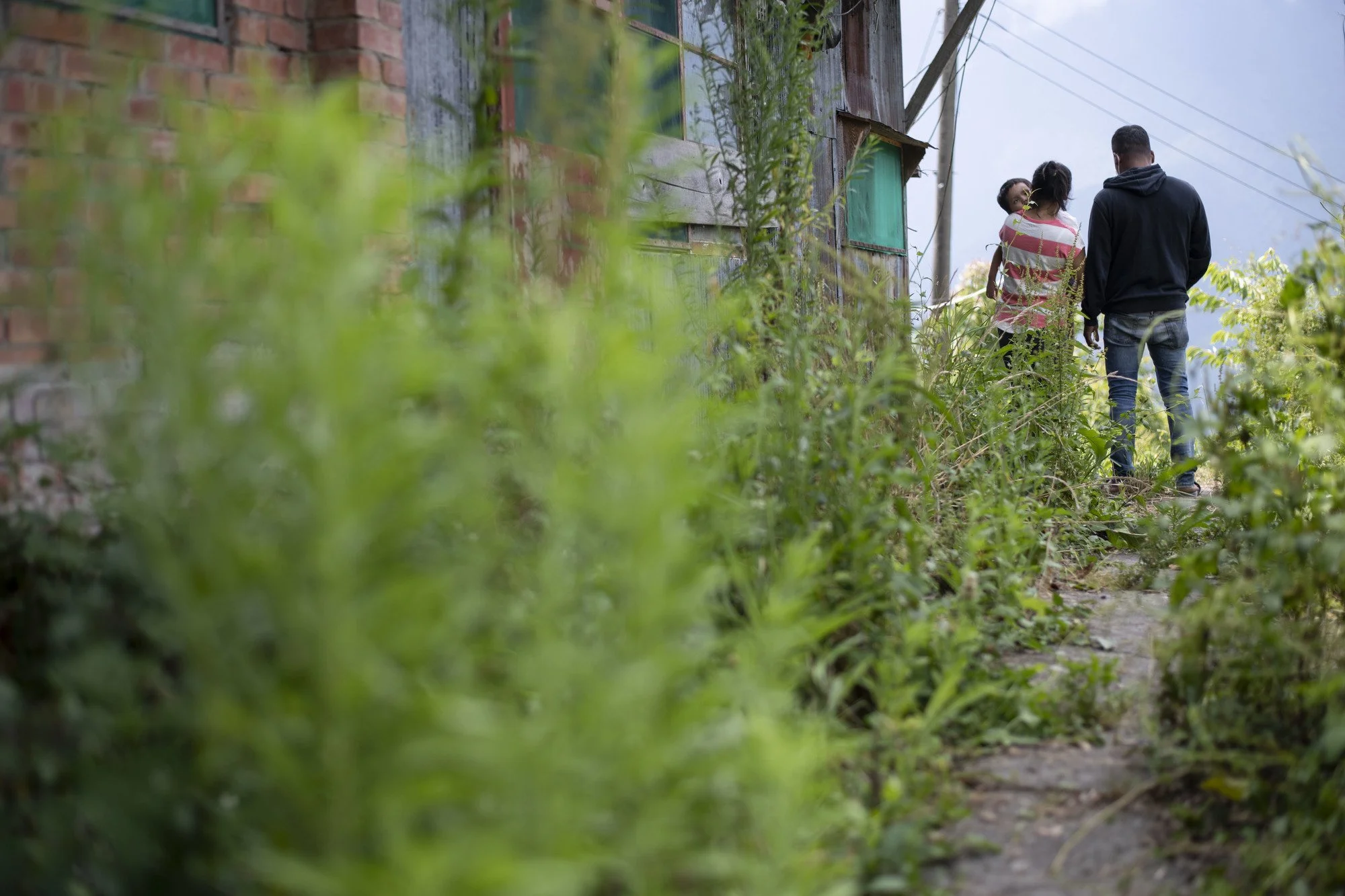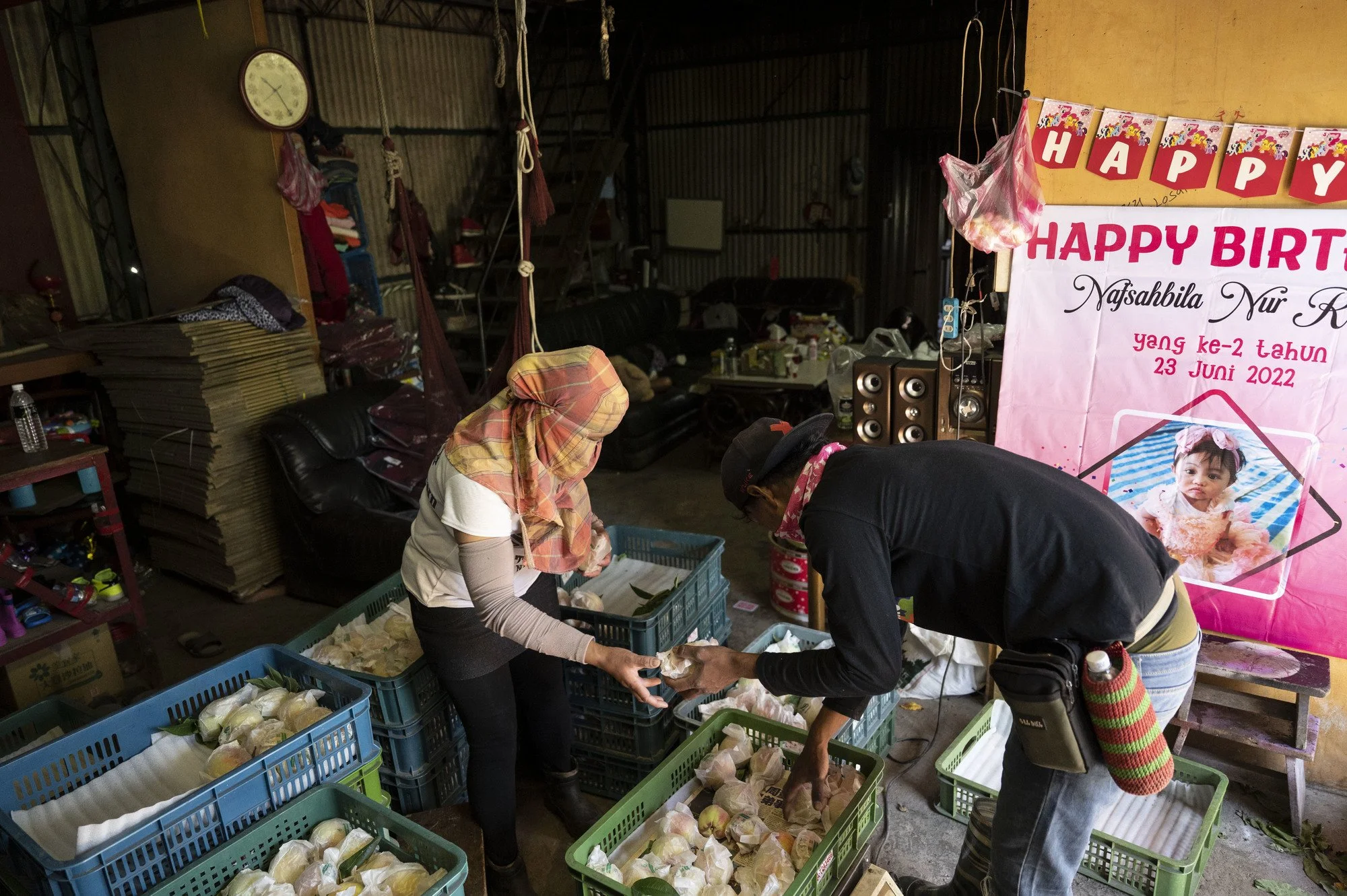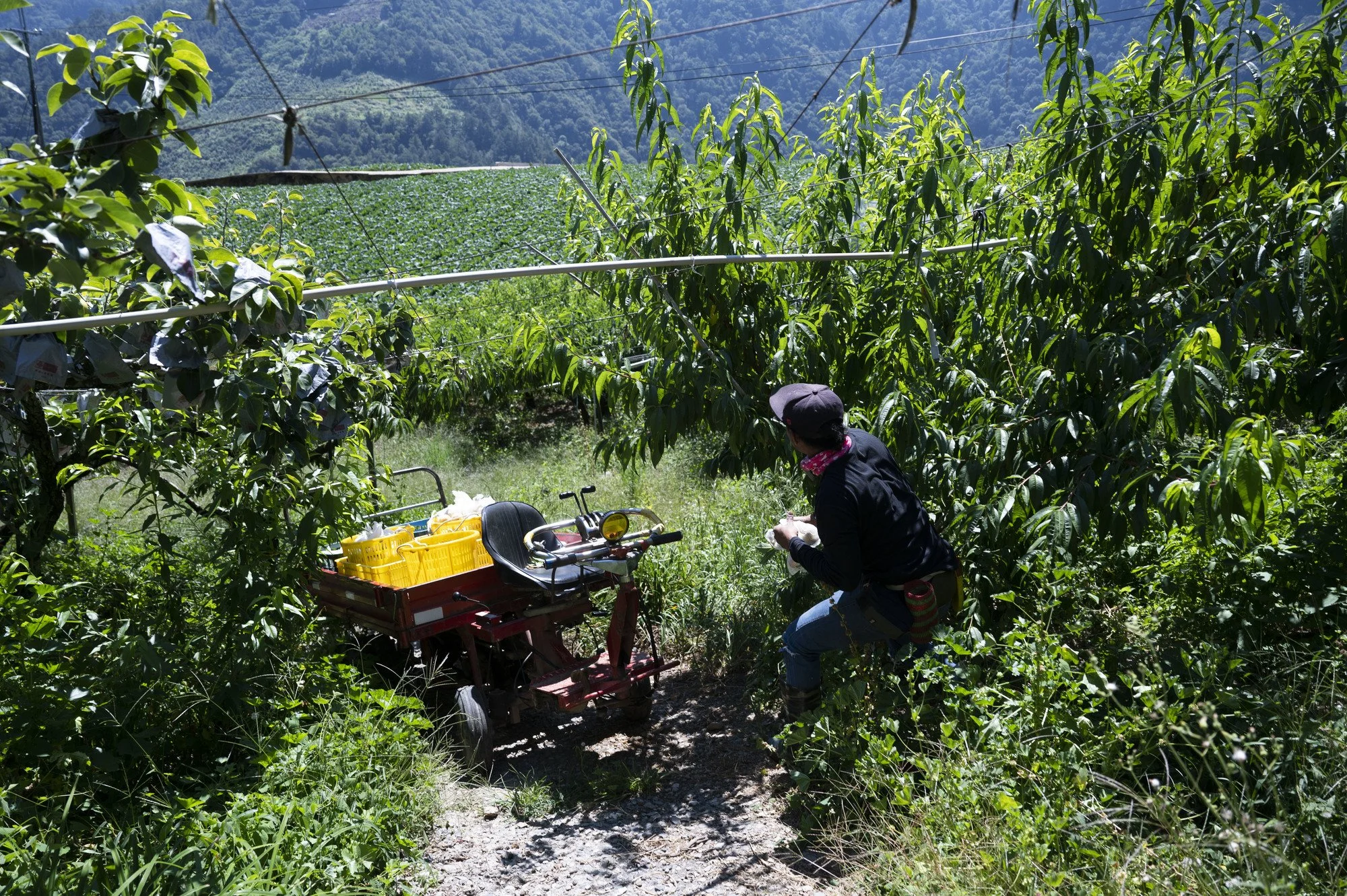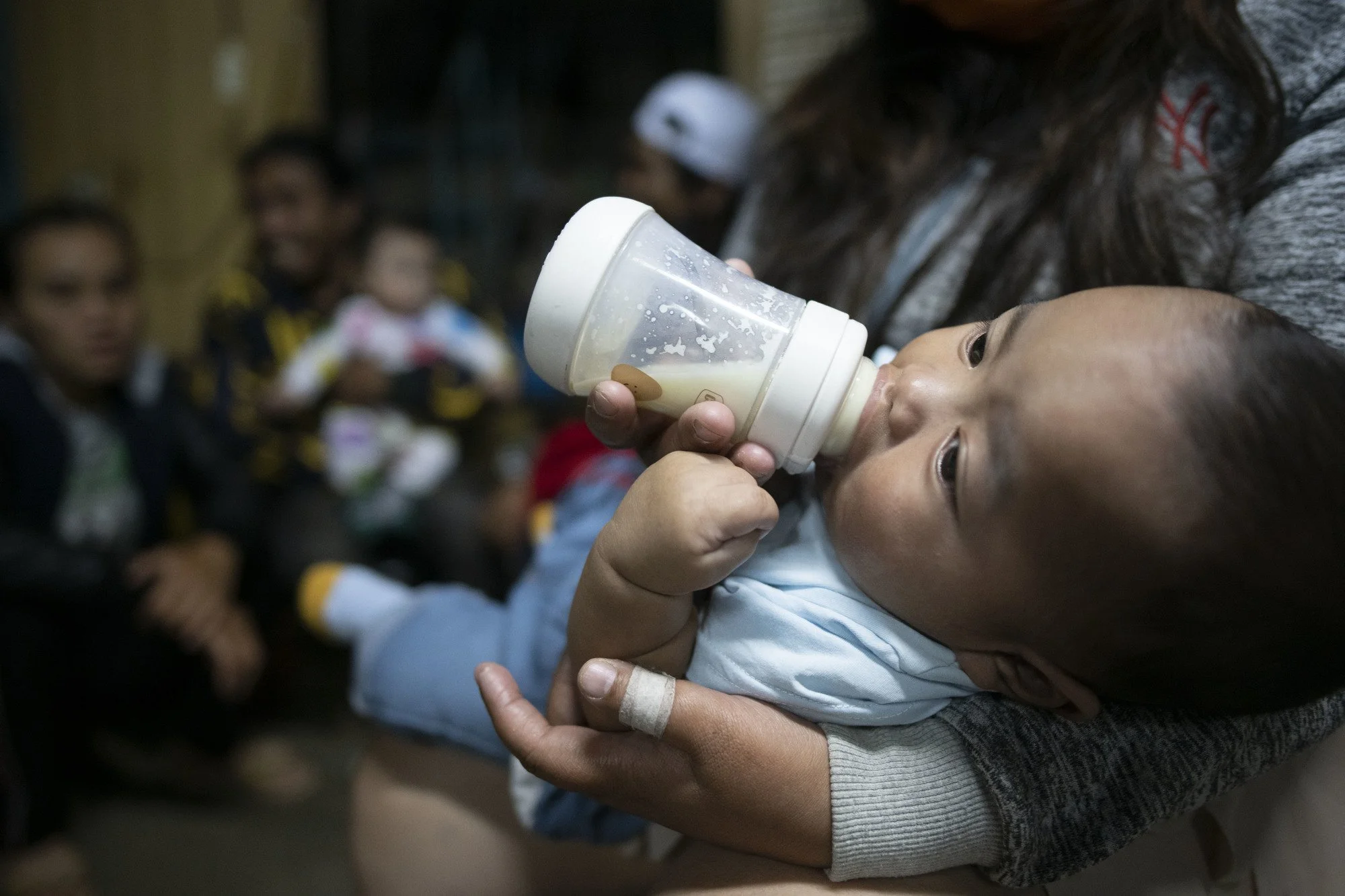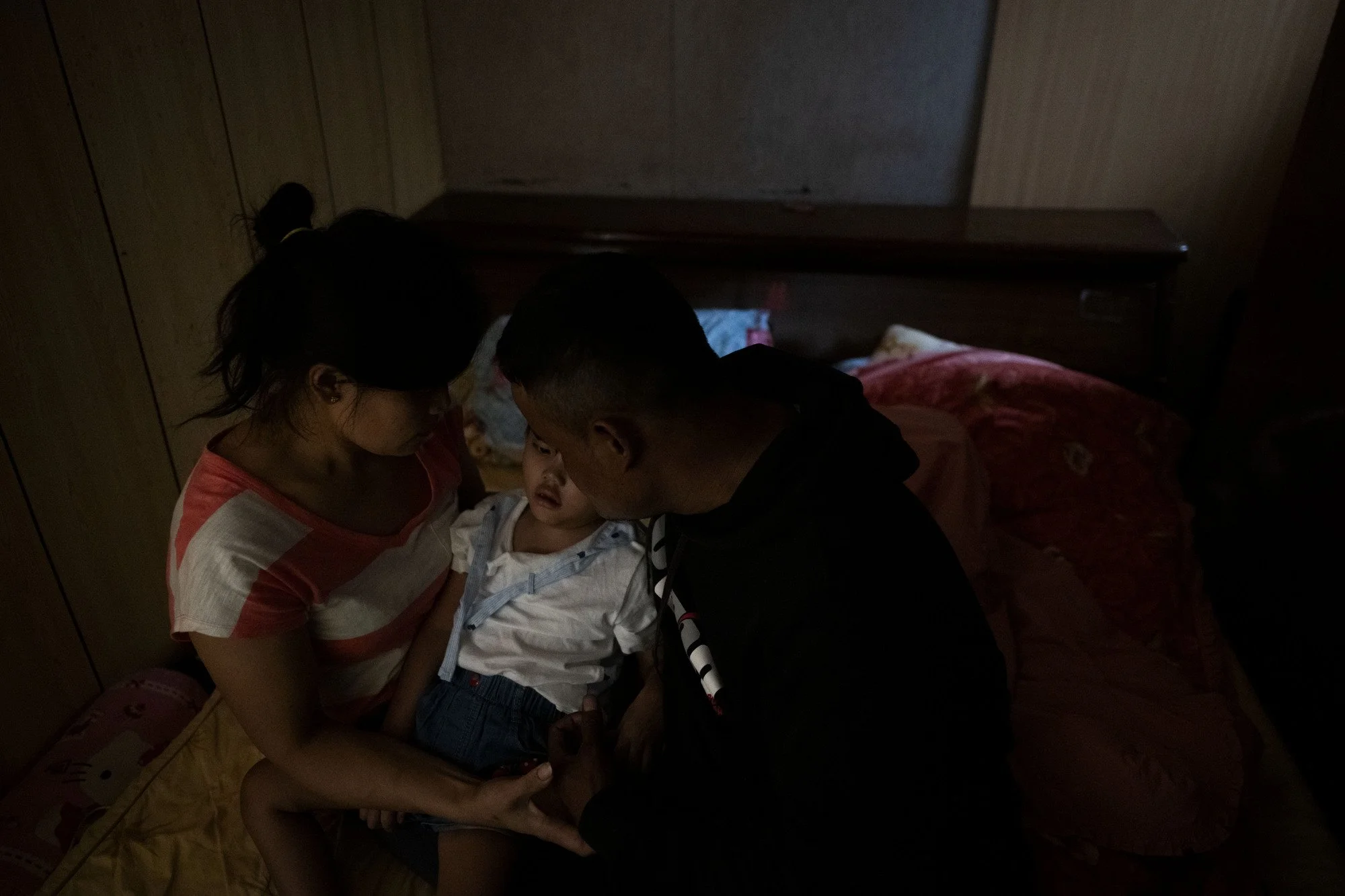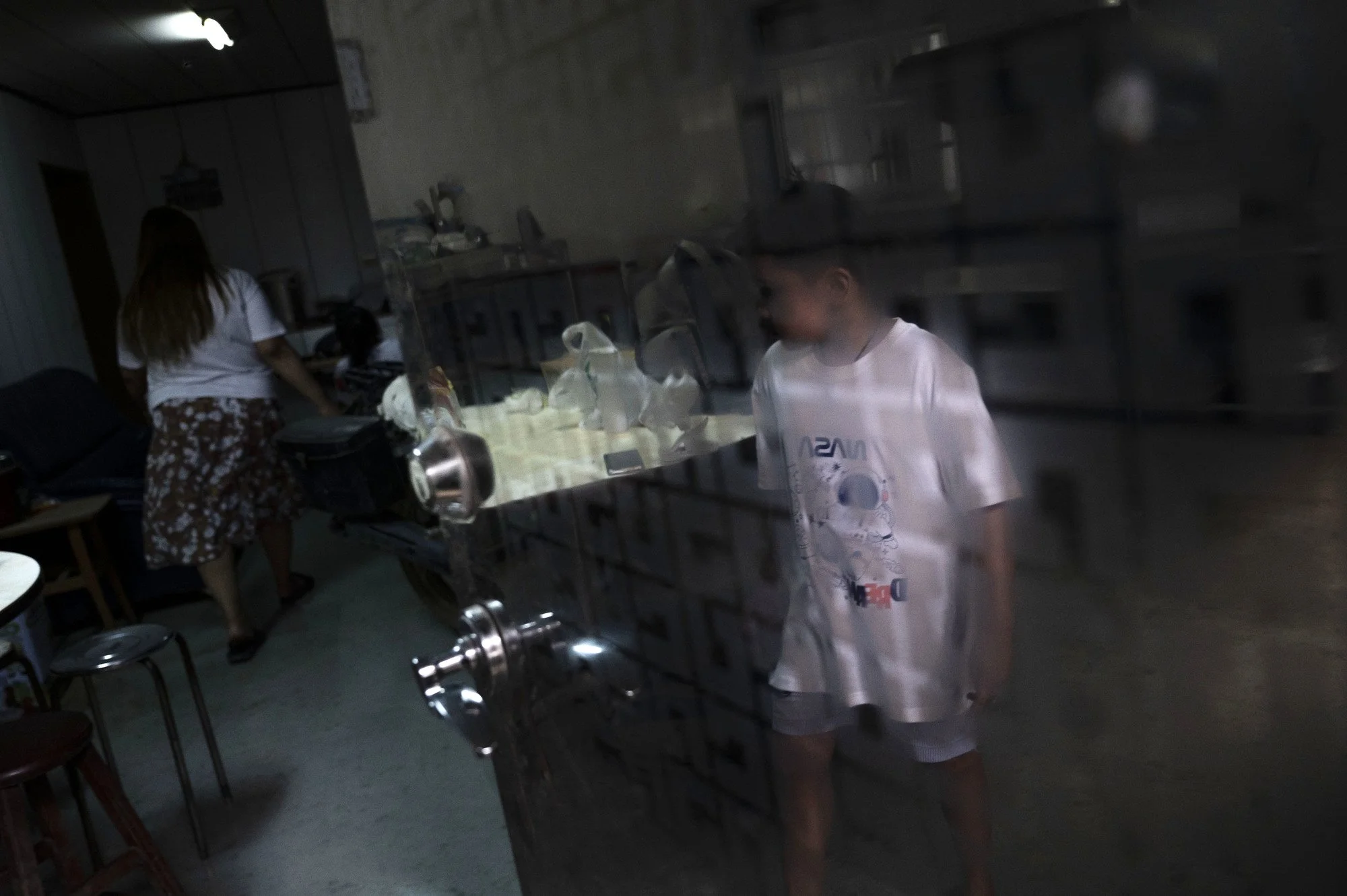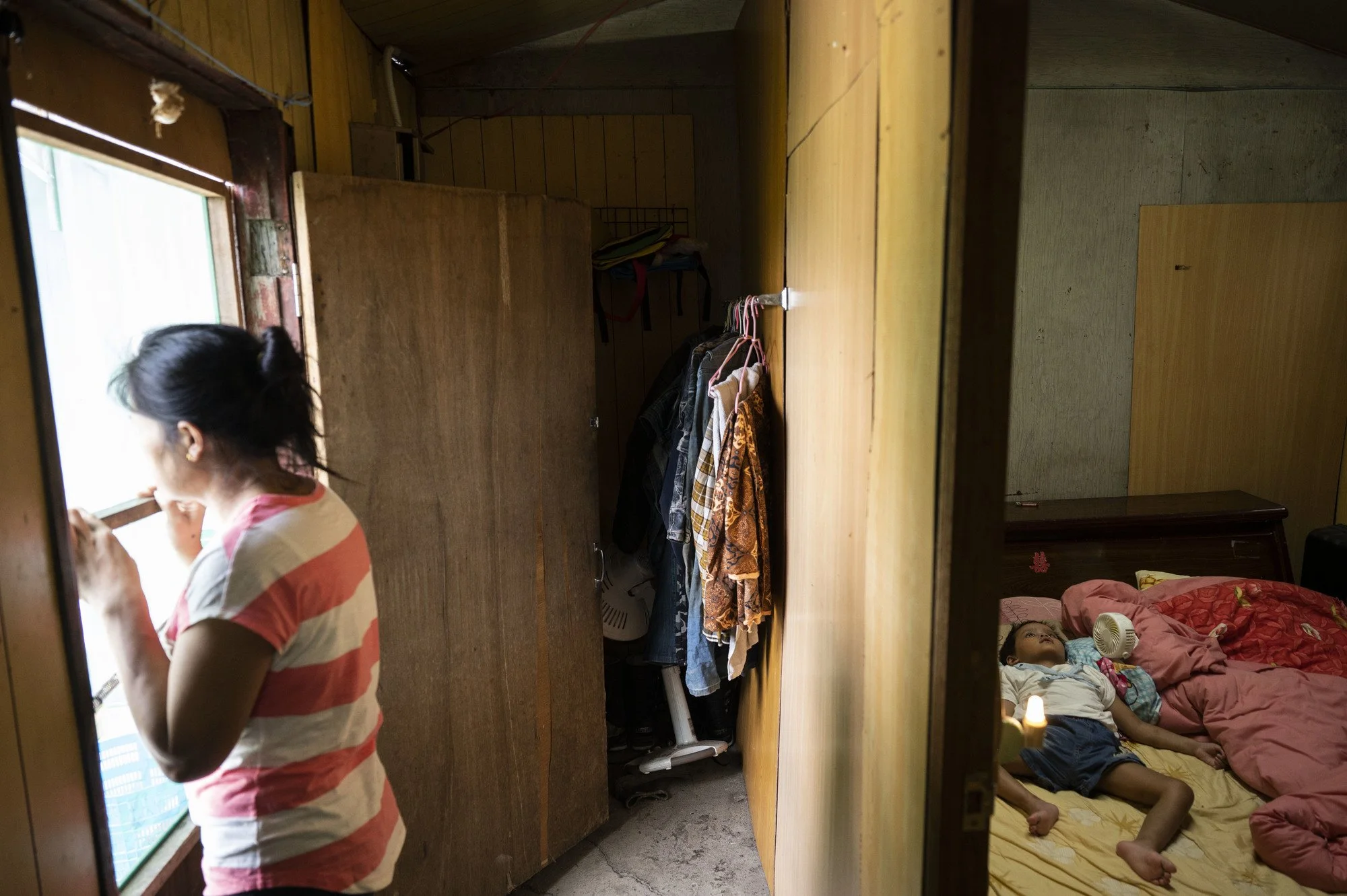The Migrant-Worker Families Who Have Taken Root in the Central Mountain Region
[PHOTO CAPTION] In the expansive Central Mountain Range, many migrant-worker couples and their offspring are flourishing in fruit orchards, vegetable farms and tea farms.
“Many foreign migrant families have chosen to settle along the Central Mountain Range. Some of them have been here for five to ten years and many have started families in their new homes,” Yang Chieh-yu (楊婕妤), founder of Harmony Home Foundation, Taiwan (關愛之家 or HHF) which offers long-term assistance and care for migrant parents, sketched out the changing livelihood of the foreign migrant workers in Taiwan. After passing over several mountain ridges, the team from The Reporter《報導者》arrived in a produce farming area in the middle of the Central Mountain Range, where about 3,000 underground (also known as undocumented) migrant workers have settled. We met several migrant families and their offspring – from toddlers to school-age children, who have not left their mountain homes since their birth. What we saw was only the tip of the iceberg.
(Fictitious names are used in place of real names of migrants and their employers in this article.)
“Happy Birthday, Nabilla!” We entered a workers’ shed built with galvanized iron sheets, and surrounded by peach trees. Inside the work shed is decorated with coloured ribbons, balloons, and small flags – it felt like we had walked into a birthday party by mistake. Half of the wall was covered by a pink canvas, and imprinted on it was the picture of a baby girl wearing a pink dress and a pink butterfly ribbon on her head. She is little Nabilla, whose Chinese nickname is “Golden”. Several days ago, her parents celebrated little Nabilla’s second birthday here.
“A party was originally planned for last year, but it had to be postponed due to the pandemic. Nearly 200 people attended this year’s party,” said Golden’s mother. She stopped sorting the harvested peaches and turned on her mobile phone to show us the video recording of the birthday party – adults and children formed a circle and sat on the floor cheering and celebrating, and a little mountain of gifts from fellow Indonesian migrant workers presented their blessing and good wishes for the birthday girl. The pink canvas imprinted with Golden’s picture was sent with best wishes by fellow migrant friends in Changhua City who could not attend the party.
HIGH-MOUNTAIN WORKER’S 200-PERSON BIRTHDAY PARTY, THE FATHER OF LITTLE BIRTHDAY GIRL IS THE LEADER OF THE LOCAL MUTUAL ASSISTANCE COMMUNITY
to his fellow Indonesian migrants to organize a mutual support group, which set up a fund to help out each other in difficult times. Many have benefited from the fund and have been calling Golden’s father their leader.
Golden’s father arrived in Taiwan at the age of 20 and started working as a fisherman in Keelung-Wanli. It was in Keelung he met Golden’s mother, who was working as a care helper. Nine years ago, they heard about better job opportunities in the mountains and decided to seek refuge in the Central Mountain Region.
For the last 11 years, they have spent most of their time in the mountains. With the addition of Golden, the family continues to make their livelihood there.
Wouldn’t working with legal status be more ideal? Golden’s mom gave a simple answer to the question: “It’s difficult to make a living in the lowland.” After probing a bit further, other reasons were revealed: A fisherman works day and night, and Golden’s dad didn’t get more than two hours of sleep a day, not to mention the frequent insults and abuse from the fishing boat captain; Golden mom’s employer did not respect her religious beliefs and made her eat pork – Golden’s mom is Muslim.
Their new employer, a fruit farmer in his 60s, owns a large peach orchard that spans three ridges. Including Golden’s parents, he employs six migrant workers to assist with planting and administrative work. Peach trees are planted on steep hillsides. It is arduous and dangerous work, but Golden’s parents feel the working conditions here are much better than in the lowland. Their workday starts at six in the morning, they rest for an hour at noon and finish work at five in the evening. Except for the emergency work brought on by typhoons or when they have to rush shipping during the harvest season, work is steady, not to mention the daily stipend of NT$1,300, which is much better than a NT$20,000 monthly income earned by a fisherman or care helper.
The main reason they feel “good” about their present situation is that their current employer is kind and treats them with respect. “Most employers of fishermen are 'big’ (dominant) and the employer here is not as ‘big’”, Golden’s dad tries to express in Chinese. He refers to the employer-employee relationship between the fruit orchard owner and migrant workers as a partnership.
When Golden’s mom found out she was pregnant two years ago, she had to undergo a cesarean delivery for the birth of the baby girl. Generally, an undocumented migrant worker who gives birth must surrender herself to the authorities and be subject to deportation to her home country after the child is born. But when Golden’s mom thought about her husband, who was still working up in the mountain, her daughter’s future education and living expenses, she escaped from the hospital and returned to the orchard.
“Our boss gives Golden whatever he has. When we are busy and cannot find a babysitter, he would come to our dormitory to help take care of the baby.”
Golden’s mom says the boss and his wife love Golden. The toys given to them by the boss are seen everywhere in their dormitory.
But underground migrant workers understand that no matter how well their employers treat them, choosing to escape means they will surrender all their legal and public health protections in Taiwan.
This was what motivated Golden’s dad to create the mutual support group. Each group member pays a NT$300 monthly fee, so that when someone encounters a difficult situation, they would use LINE to ask for and immediately get help from the other members. For example, one of the members fell and suffered a broken bone at work. Golden’s dad accompanied him down the mountain to seek medical care and provided a NT$30,000 subsidy from the fund to cover medical expenses. In situations such as illness, arrest and deportation, sums of a few hundred to thousands of NT$ have been disbursed. Currently, there are 38 members in the mutual support group.
As Golden’s dad speaks, he pulls out an unwrapped red windbreaker funded through the group fees, with a logo on the back showing two hands in a warm handshake with a pair of golden wings, an inscription of the name of the mountain and the words “The Big Family”. On the cuffs, prints of the Indonesian and ROC national flags are side-by-side, representing Taiwan-Indonesia cooperation, the design also indicates their close dependence on the local community.
SHORT SUPPLY OF LOCAL LABOUR FORCE IN THE AGRICULTURAL SECTOR OPENS UP A SPACE FOR “LONG-TERM EMPLOYMENT” AND “TEMPORARY WORK”
[PHOTO CAPTION] There is difficulty attracting young Taiwanese to the agricultural sector, where the work is hard. In the last 10 years, undocumented migrant workers have gradually filled the gap. The photo shows Golden’s dad harvesting peaches in the orchard.
In the last 10 years, there have been more and more Southeast Asian workers appearing in farms, seed-development and agricultural-product processing plants all over Taiwan. Aside from new immigrants, undocumented workers make up a large proportion of this labour force. One of the groups came to the Central Mountain Region farming settlements through referral by friends or underground agents. Travelling back and forth on motorcycles between high mountain vegetable, fruit and tea farms, as well as engaging in all activities from planting to procurement, these workers have become an indispensable part of the supply chain of the farm industry in Taiwan’s highlands.
How large is this labour force? According to the analysis of new immigrant Nguyen Kim Hong (阮金紅), a documentary director from Vietnam, most migrant workers have worked in the agricultural industry in their home countries. After they go underground, about 70%-80% return to farming. Underground migrant workers have increased in number year-over-year and accelerated during the post-pandemic period. The total number of migrant workers in Taiwan is about 690,000, with about 70,000 of them having gone underground. During visits to the farm settlements by The Reporter《報導者》, we observed a lineup of underground workers waiting to be vaccinated extended several hundred metres. The local village warden and main employer in town estimated there could be more than 3,000 underground migrant workers in the neighbouring mountains. Most of them are Indonesians, with workers from Vietnam coming in second.
“As you walk near the field, most of the people you see are foreigners, who definitely outnumber Taiwanese,” one local employer says.
As time goes by, they start from an individual or a couple and gradually expand to form households with the addition of children. Amid the clouds and mist in these mountains, from points and lines to plains connecting many settlements, compatriots and friends from mountain tops to faraway lands have formed a strong cohesive network to provide mutual support.
In the mountains, through the help of middlemen, we interviewed several underground Indonesian migrant families and discovered that their three keys to survival in the mountains are: well-paid job opportunities, a strong and cohesive network among compatriots and a good employer.
The vast number of job opportunities comes from the labour gap between supply and demand in the agricultural sector.
“In the old days, farmers did everything themselves. Nowadays, second-generation farmers focus on managing and assigning work activities. Without the foreign migrant workers, the vegetable farms would have to be folded.”
We come to a cabbage field on another mountain. Second-generation farmer Mr. L is very forthcoming. Mr. L is one of the very few Taiwanese owners who is willing to accept our interview anonymously. Most owners choose to remain lowkey, as they do not want to acknowledge the hiring of underground migrant workers.
“The signs of an accelerated aging Taiwanese farm population started to show about 20 years ago. The government noticed this trend, but the policies it implemented could not quite solve the problem,” says Professor Yang Min-hsien (楊明憲) of Feng Chia University’s Department of International Business and Trade, who is a former head of the Agriculture Department of Changhua County. He says the government has indeed invested substantial resources to attract young people to join the farm trade, but the policy direction is to train young farmers to become managers and successors. He also points out that the shortfall in the farm labour force stems from the shortage of labourers rather than the quality of a young farmer’s management skills.
The village warden we interviewed says Indigenous residents were the main source of the local farm labour force. However, farm work is too hard and therefore generally unattractive to the younger generation. With the encouragement of policies attracting young people back to the villages in recent years, almost 80 percent of local young people have returned, but most of them choose to join the tourism and service industries.
Older farmers have difficulty doing the hard physical farm work and young people do not want to do the work. The labour shortage has been gradually filled by underground migrant workers. Those who dedicatedly work for a certain employer are called “long-term” workers, those without a fixed employer and who get paid per job are considered “temporary” workers. From our interview, we learned that due to the increasing labour shortage during the last 10 years, the daily wage rate for local migrant workers has increased from NT$800 to above NT$1,300, excluding overtime pay. As well, migrant workers have organized themselves into “tea harvest” groups, in which they travel to work in different tea-growing regions during the harvest season, and the skilled workers could earn up to NT$5,000 a day.
“They say there are legal migrant workers for the agricultural industry, but very few have been let in. We find it difficult to apply for them, unlike the “temporary” workers who are just a telephone call away,” said Mr. L, who has been hiring underground migrant workers for nearly 20 years.
RESPONDING TO THE NEED FOR CHILDCARE, COMPATRIOTS BECOME CHILDCARE PROVIDERS, “ALL THE NEIGHBOURING COMMUNITIES KNOW THAT”
[PHOTO CAPTION] Walking past the fruit baskets and farm equipment piled outside of the workshed, inside is a mini nursery filled with children's laughter and noise. Childcare providers are feeding the babies held in their arms, waiting for the infants’ parents to pick them up after work.
In the farm worker settlement we visited, the number of underground migrant workers has increased year after year, especially during the post-pandemic period. Many mothers brought their children up to the mountain, and some conceived after their arrival. Presently, at least 50 infants – especially the number of infants of Indonesian migrant workers – is much higher in proportion than the Vietnamese migrant workers in the same farm worker settlement.
The busy migrant parents cannot take their young children to work as their job involves lots of climbing and trekking. The enormous need for childcare leads to the growth of childcare networks.
It was half past seven in the evening when we trekked down the hilly path. After zigzagging several turns, we arrived at a workshed with piles of plastic baskets, carton boxes and farming equipment. Without proper direction provided by anyone or any introduction through trusted friends, it would have been difficult to find this nameless nursery. In anticipation of our visit, childcare provider Ida also invited Ananda, who is a childcare provider from another farm worker settlement, along with the children under her care to meet with us. About 10 infants were still in diapers and some others learning how to walk, happily playing and making noise. When evening came, parents who had just gotten off work quickly filled the workshed. Conversations in Indonesian and Javan, and the scent of foreign dishes filled the room - it almost felt like we were in Indonesia.
Ida brought a sizzling hot pot with chicken and fried tofu to the table, and she signalled everyone to take their seats. She is the most experienced childcare provider on this mountain. Children call her Mak Ndut (fat mama). Seven years ago, Ida left her caregiver job and escaped to the mountain and joined her boyfriend on the farm. Unfortunately, she injured herself the next year after falling from a high elevation while harvesting. During her recovery, a migrant worker had asked Ida to help care for her child. By word of mouth, Ida started taking care of more children and it has since become her full-time job.
According to Ida, in the past six years, five childcare providers have worked on the two mountains we have visited. Each of them takes care of two to five infants, their fees are NT$500 a day. The parents are responsible for the infant’s diapers and milk powder. Children are brought to the nursery at 6 AM and picked up in the evening. If the parents are too busy, childcare workers may provide overnight care, free of charge.
Currently, Ida is looking after five children ranging from one month to two years of age. Surveying around the workshed, one almost does not notice the existence of toys, children’s reading materials or other signs of a typical nursery. Ida says she usually recites the Quran and prays with the children, teaches them the Indonesian language, plays games, sings nursery rhymes and watches animation videos available on YouTube with the children. Recently, the English songs and life activity teaching materials on the Cocomelon Channel have been very popular and preferred by children.
Do the local Taiwanese people know about the growing number of migrant worker children that has brought into being a childcare service industry? “Of course they do, even some of the Taiwanese farm workers have asked me to take care of their children,” Ida says. Local Taiwanese have also donated children's clothing, cookies and baby buggies, and one of them rented out this workshed to Ida for NT$4,000 per month. Migrant workers often hold social gatherings and karaoke parties here. That is common knowledge to everyone in the neighbouring communities.
EMPLOYERS TRANSPORT MIGRANT WORKERS TO GIVE BIRTH AND TAKE INFANTS TO RECEIVE VACCINATIONS – “WE ARE LIKE A FAMILY”
“It’s no longer an unusual sight,” fruit farmer Big Elephant says about the increasing number of migrant worker families and children. “At the beginning, we wondered why there were foreign children. Before long, we saw in amazement that there was an increasing number of migrant worker parents holding in their arms and at the same time carrying young children on their backs.” He says underground migrant workers in the mountains are from Vietnam, the Philippines, Thailand and Indonesia. Probably due to religious reasons that prohibit abortion, Indonesian workers are more inclined to give birth to their children. Nowadays, the sight of several family members riding together on a motorcycle is not a rare occurrence, as far as Big Elephant is concerned.
Four years ago, one of Big Elephant’s migrant worker employees conceived a child. Hasan and Arie, the couple who came from western and central Java in Indonesia, have worked for him for six years. The couple are disciplined and very hard working. Big Elephant helped them to settle down in a workshed located next to his home. “Then Arie got pregnant and they told me they wanted to have the baby. I was happy for them because my wife had been in a similar situation.”
Big Elephant’s wife was a foreign migrant worker who went underground. After she gave birth to their baby, she surrendered herself to the authorities and returned to her home country. She filed and applied for a marriage license and then returned to Taiwan with her new resident status. With this personal experience, Big Elephant is very sympathetic to the situation of pregnant migrant workers. He once ran a private taxi service on the side, and occasionally he gave rides to female underground migrant workers that are in-labour who had to take the long, hours-long journey through mountain ridges directly to a hospital in Puli, Nantou County, or through GAZJ in Taipei while enduring labour pains without the company of their husbands, as the men were fearful of being caught by the authorities. “The expectant mothers are very brave,” says Big Elephant.
GAZJ has long been assisting migrant worker expectant mothers who, in turn, deeply trust the organization. As a result, migrant workers, whether legal or undocumented, rush to seek help from it. Upon arrival, underground migrant expectant mothers are led by GAZJ staff to first surrender themselves to the Immigration Agency, then to undergo prenatal examination and pre-labour procedures; both mother and baby would be sent back to the mother’s home country after the baby’s birth. There are cases in which the underground migrant mothers would flee the hospital before they could be repatriated.
Arie also received help from GAZJ on her daughter Mozha’s birth, and she chose not to return to her home country. Almost immediately after the baby’s birth, she returned to the mountain. Her boss, Big Elephant, was invited to the party to celebrate the new baby’s arrival. The two families not only work together but are neighbours, and they have frequent social interactions. Hasan often invites him to barbeque parties to celebrate Indonesian festivities; at every Indonesian New Year, Big Elephant gives Hasan money so that he can buy food and share it with his fellow Indonesian friends. The children of the two families are of similar age and were great play pals growing up. “We are just like family,” said Big Elephant.
Although not every family is like that of Mozha, Golden’s family and the employer are harmonious. Based on our interviews and observations about the growing number of underground migrant worker families in these mountain communities, Taiwanese farm employers have shown a high degree of tolerance and understanding because, firstly, the availability of temporary workers on short notice fills the labour shortage gap when female migrant workers give birth and take leave; secondly, the local labour market situation is such that employers are reluctant to lose the trained and specialist workers and, therefore, are more willing to accommodate the needs of migrant workers. Lastly, both parties have established a rapport and deep friendship and employers tend to show goodwill in their dealings with migrant workers.
“We treat our workers well, and they reciprocate.”
Cabbage farmer Mr. L has just used his car to take a migrant worker to Puli to deliver her baby. He says medical resources are scarce in the mountains, and employers must assume more responsibility to look after the health issues of their employees. “When a worker gets pregnant, I drive her to go give birth; after the birth of her baby, I take the infant to get immunized, as long as our employer-employee relationship is not disclosed in case she gets caught.”
PREDICAMENT 1: DIFFICULTY IN GETTING MEDICAL HELP, APPREHENSIONS AND BLEAK PATIENT'S RIGHTS TO ACCESS MEDICAL SERVICES
[PHOTO CAPTION] As the active and adorable Mozha collapsed from her brain tumour, the family had to change their plan to return to their home country this year. The lack of facilities in the mountains makes Mozha’s case of getting timely access to medical resources a rare and isolated one.
The lack of legal status, health insurance and suitable transportation make healthcare issues a hidden risk that the migrant workers in the mountains face.
Fear of being sent back to their home country makes underground migrant workers flinch from seeking prenatal examination. Expectant mothers have been circulating a list of “trusted medical clinics” in recent years, but while the list has grown, these facilities are mostly concentrated in the lowland urban areas.
Arie was already 40 years old when she conceived. She was concerned about the baby’s health, so she went to Taoyuan for a prenatal checkup every three months. Hiring a taxi to travel down the mountain would cost several thousand NT dollars. To save some money, she chose to take a combination of long-distance and intercity buses to visit the clinic leaving early in the morning, and by the time she returned home it was already late at night.
When she escaped with Hasan to the mountains, she did it for a freer lifestyle and better pay compared with what she could get on the lowland. After the birth of Mozha, the objective to make more money was for raising the baby and a better future for her. After the postnatal rest, Arie asked her friends to take care of the baby girl. To resume work in the fruit orchard quickly, the couple also decided to work even harder so that, when Mozha is four years old, they would surrender themselves to the authorities to enable the child to attend school in their home country.
Their original plan was to return home this year. Unexpectedly, Mozha fell ill and it changed the fate of the family.
Arie says, in the beginning, she noticed Mozha was acting strange, slightly losing balance when walking, had slurred speech and seemed to have difficulty focusing. She thought her daughter was just tired, then in November last year, Mozha unexpectedly collapsed.
Arie could not believe it because her daughter was dancing the day before she fell ill. No matter how Arie tried, Mozha could not be awakened. The local health office wanted Mozha to be sent for immediate medical help. She recalled GAZJ, the organization that helped her with childbirth, and Arie immediately rushed to Taipei to seek help.
Test results indicated that Mozha’s brain tumour was already at the fourth stage. The tumour in her cerebellum was putting pressure on the nerve that controls body motions, thus impairing her ability to move. The doctor told Arie that Mozha might not be able to open her eyes again.
Deris, a staff member of GAZJ and a new Indonesian immigrant, kept Arie company all the way. He recalled: “At that time, we did not know whether Mozha would recover and what would be her chance of survival. Arie was so sad that she almost wanted to die, but she remained strong.
Staying behind in the mountains, Hasan was sleepless all night and consoled his wife over the phone. The surgery lasted 14 hours and the couple were able to heave a sigh of relief only after they were informed by the doctor that the surgery had been successful.
The bigger battle was actually the nine sessions of chemotherapy following the surgery. Mozha’s medical expenses exceeded a million NT dollars and it exhausted the entire savings of the family. Currently, GAZJ assisted in raising about NT$260,000, the social workers at the hospital who admitted Mozha also tried to look for additional money to fill the gap, and the rest of the shortfall was absorbed by GAZJ. After the operation, Mozha luckily regained consciousness, but her limbs still had no strength. Arie surrendered herself to the Immigration Agency, to which she had been reporting weekly. She spent the rest of her time taking care of Mozha in GAZJ, “GAZJ has helped us a lot,” said Hasan and Arie.
The network of underground migrant workers also helped. Since Hasan and Arie are members of the mutual support group led by Golden’s father, they also received an emergency assistance payment. Fellow Indonesians in the mountain also held a fundraising campaign.
In a short year, apart from Mozha’s sickness, Hasan’s parents and Arie’s mother passed away one after another. Suffering from the effects of these traumatic events in addition to the couple’s worry for their daughter, the introverted Hasan would only hide and cry in his room.
Big Elephant feels for Mozha.“ She is so cute and her eyes are so beautiful! Look at her now, I feel very bad.” He says Hasan does not allow his personal feelings to affect his work, nor would he likely show his emotions. “When he comes to ask for a drink, I know he must be sad. He is such a nice person, so friends and I all join him to drink.”
The timely availability of medical assistance to Mozha is a rare case. During our interviews, we heard about more cases of serious illness suffered by infants and below-normal development children of the underground migrant worker group. Unable to access adequate medical assistance, the local village warden said these children had to live like phantom residents because their parents were concerned about being caught and the prospect of excessive medical expenses if their illness became grave. They are afraid of taking the children down the mountain to seek medical help in reputable hospitals. Observance of children’s rights to receive adequate medical services is bleak.
PREDICAMENT 2: LACK OF AMBIENT STIMULUS AND LEARNING OPPORTUNITIES, CHILDREN LIVE IN A WORLD OF MOBILE PHONES
[PHOTO CAPTION] Except for the visit four years ago to Taipei for medical treatment for a broken leg, 8-year-old Yangyang continuously lives in the galvanized metal-sheet workshed near the cabbage farm, he only interacts with his parents and the farm employer “Grandpa”.
Another hidden risk is the children’s education issue.
Yang-yang is eight years old this year. For the first time four years ago, he left the cabbage farm in the mountain where he grew up because he had suffered a broken leg after accidentally falling from the second floor of the work shed. After the medical operation in Taipei, his mother brought him back to the mountain, and the implanted steel plate remains in his little leg.
Eleven years ago, Yang-yang’s mother could not bear the sexual harassment by the senior she was looking after, and she chose to escape. Introduced by a friend, she met Yang-yang’s father, who was already working for a cabbage farm up in the mountain. They decided to stay together and Yang-yang was born three years later.
The worker’s shed, where Yang-yang’s family lives, is the farthest and most remote location of our information-gathering project. It is on uninhabited land;with the exception of a few casual farm vehicles passing by, youcan hardly see anybody. “Haven’t you considered returning to Indonesia with your child?” Yang-yang’s mother shook her head, “I have not because my boss is very good.”
Her boss is in his 70s and is the biggest landowner in the area. Yang-yang’s father has worked for him for the last 11 years and has become his key assistant on the cabbage farm of about 3 hectares. “The boss was so happy for me when he learned about my pregnancy. He took me to Puli every month for a prenatal checkup. He was the one who took me to GAZJ in Taipei for the delivery of my baby,” Yang-yang’s mom says. The boss treats Yang-yang like his grandson, he is generous in providing the child food, clothing and day-to-day necessities, and Yangyang calls him “grandpa”.
Although we do not have to worry about the day-to-day necessities, Yang-yang’s lack of interaction with anybody outside of his parents and “Grandpa” has become our concern. He can understand Indonesian and some Chinese, and mix the two languages when he talks, but he cannot complete sentences. When he refers to events or things, he can only express them as “this” or “that”, and when he cannot identify the proper names, he starts to scream in anxiety.
“What would you like most? Where do you want to go to play?” Yang-yang did not reply. We asked about the daily life of mother and son, and Yang-yang’s mother said her son would prefer playing with the mobile phone. She would use the video on her mobile phone to teach Yang-yang ABC and the Indonesian language. We suggested playing a game of writing each other’s names with him, but Yang-yang’s mom said he couldn’t. Keeping us company on the visit were two seven-year-old Indonesian girls, who tried to approach Yang-yang, but he anxiously ran back and hid in his bedroom.
We changed many topics but still could not draw out a direct response from Yang-yang until we asked what he usually does. A flicker of light appeared in his eyes and he said: “Game!”
He quickly scrolled the screen of the phone and opened an app that simulates the activities in a high school setting. The game included the challenges of attending a class, going to a restaurant, and riding on a swan boat and a Ferris wheel. The imaginary world includes the disappointments he would experience in the real world. In Indonesia, he would be in third grade, but Yang-yang can only simulate a student’s life up in the mountains. In the game, he could greet the fictitious characters, engage in conversation with them and embrace them. However, when he sees and meets children of his age group in real life, he is afraid and does not know how to handle and interact with them.
We have asked Yang-yang’s parents many times whether they would consider returning to Indonesia with the child so that he could attend school. Yang-yang’s mom indicated they had discussed the matter but that they are accustomed to living on the mountain, and they still have to send money home. The urgency to go home subsided as Yang-yang’s grandmother, who wanted so much to meet her grandson, passed away several years ago. Yang-yang’s father hopes his family of three will stay together and defer the discussion of returning home to a later day.
Assisting migrant worker mothers and children for more than 10 years, GAZJ has helped many underground migrant expectant mothers from the mountain region. As the relationships developed by the support programs are built on trust and belief, Yang Chieh-yu has never asked about the mothers’ domicile information. “If by any chance the mother is caught, she may mistakenly believe we are the ones who have reached out to the authorities and that is not good for both parties.” Yang said they do not try to approach the mothers after their departure. Only when news about the underground mother and child comes through do they then find out: “Oh, after 7-8 years, this child is still in Taiwan?”
Occasionally, in communications with migrant worker mothers, Yang Jie-yu always encourages them to send their children to their home countries to attend school. After all, the longer the postponement, the longer the delay in the child’s development. On the other hand, she also heard that, in the remote areas of Indonesia where there are no schools, parents usually teach their children language and religion themselves. Some Indonesian parents who work in the mountain regions of Taiwan hold a similar view when it comes to educating the next generation. Progress of children’s learning and development remains Yang Jie-yu’s concern.
Upholding a steadfast position of support for migrant worker families, Big Elephant also considers the education of migrant workers’ children a significant issue. He saw in the neighbourhood some children of Taiwanese and Indonesian parents remain without nationality because a DNA test to confirm the paternal relationship has not been taken, and nationality is a school admission requirement. As a result, some children in the 11-12 age group are still not attending school (Note).
“Finding a way to allow the children to attend school would be the best solution. We don’t want them to grow up without being properly educated and miss the window of learning opportunity when they (with their parents) return to their home countries at an older age.”
(Note) Children of ROC nationals and underground migrant workers may apply for ROC citizenship and attend school legally. Even children without nationality may attend classes in public primary schools through a special provision administered by the local education department. However, the parents involved in this case have not actively pursued the issue of child schooling.
ENFORCING THE SEARCH AND CAPTURE OF UNDERGROUND WORKERS WILL ONLY TREAT THE SYMPTOMS BUT NOT THE ROOT CAUSE
[PHOTO CAPTION] The interviewed migrant-worker parents tell us they have raised their families in the mountains over the last 10 years, and that both Indonesia and Taiwan are their homes.
Over the years, the unresolved issue of underground migrant workers has had a domino effect on the next generation. Although addressing the issue requires the careful design of public policies to strengthen the rights to benefit, improve labour conditions, hiring methods, etc. for migrant workers, the pressure of prevailing public opinion to take a harder line on migrant searches and deportations has fallen squarely on the shoulders of law enforcement.
Could strict enforcement be relied upon to reduce the number of undocumented migrant workers, and by extension, to prevent babies from being born to underground worker mothers?
Among the migrant workers, they organize themselves into LINE chat groups by work zone, nationality, social club, etc. When they learn where migrant workers are caught or identify checkpoints on their motorcycle rides, they react more quickly than employers and immediately spread the information to alert members of their group to stay away.
Sometimes news about a raid is disseminated days ahead of the operation. Employers would ask the workers to stay home. Although there are many worksheds in the mountains, when lights are turned off, it is hard to detect them. Children are accustomed to following the adults to hide from the police, a single word of “police” will immediately silence the kids.
The interviewed employers and migrant workers openly admit that there is a shortage of labour in the mountain region. Even some of the police officers who have farmers in the family would hire underground migrant workers. There is an understanding among the locals and law enforcement officers that, as long as the migrant workers do not cause any trouble, and unless someone reports it or a criminal act is committed, they are seldom apprehended. They say if you catch all the underground workers, who are going to take care of the vegetable farms and fruit orchards? How significant an economic loss would it cause? Unless a reasonable solution to handle the labour issue is found and an iron-fist approach is taken instead, there certainly will be backlash from the employers.
It is also tough on the law enforcement side, said the special task force of Taichung’s Immigration Office in response to questions by the Reporter《報導者》, adding that residents in the mountains alert the others when outsiders are detected. In the past, when residents would see the presence of immigration officers, they would turn around and ignite firecrackers to notify the others in the mountain. Now, residents have advanced to using communication software to send warnings.
The complex mountain terrain significantly increases the risk for search and capture operations, during which there have been injuries suffered by immigration officers. The special task force at the Taichung Immigration Office notes that their operations do not necessarily take place on an established road in the mountain – they may occur in spots of rough and rusty cages for the transportation of vegetables, steep hillsides, roadless mountain forests, ridges among trees, and they may also encounter ferocious guard dogs, which make it all dangerous to both the officers and targets alike.
The special task force indicates they have tried to identify the illegal middlemen who act as brokers for underground migrant workers, but the employers usually are not willing to disclose the source of the migrant workers. Discussions are mostly limited to individual cases, making it harder for any breakthroughs.
As a matter of procedure, when an underground migrant worker with a child or children are found, authorities do their best to assist them to return to their home country. Early this year, Taichung’s special task force found a Vietnamese migrant worker who was raising a five-year-old girl by himself, the whereabouts of her Indonesian mother unknown and the child was without nationality that could be confirmed by a birth certificate. With the arrangement of a DNA test of the father and daughter, the Vietnamese government representative was contacted several times and immigration authorities coordinated with them to obtain a Vietnamese passport for the migrant worker’s daughter. After going back and forth for several months, both the father and daughter were finally sent back to Vietnam.
Does the Immigration Agency have a good handle on underground migrant workers getting married and raising children in the mountains? What is the government’s view?
Despite our attempt to pursue the matter, we did not get a direct response. Chang Wen-hsiu, head of the enforcement and international affairs branch of the Immigration Agency, indicates his office is applying for an employment stability fund to hire social workers to staff the northern, central and southern regional offices, and a placement office of childcare workers to accommodate underground migrant worker mothers and their children. As of now, the central region office has not taken in anybody yet.
On the question concerning whether there is a tabulation of the number of pregnancies of the identified underground migrant workers, Chang Wen-hsiu’s answer is negative. The objective of migrant workers coming to Taiwan is to make money, and losing their protected rights would be a disincentive if they choose to go underground, and so the number of pregnancies among them should be limited, he concluded.
In the last three years, the Immigration Agency and related departments have investigated and processed 20,000 underground migrant workers. Chang Wen-hsiu stresses, when they conduct an investigation and run an operation, they only consider the legal aspect with no prejudgment on location and type of business. “The issue (of the rights and benefits of children of underground migrant workers) is that workers are going underground, and so the question is how to prevent migrant workers from going underground.” Chang Wen-hsiu says he would continue to offer policy suggestions to the Labour Department, integrating the front-end administration of point of origin with the investigative and handling procedures on the back-end, to solve the problem by working from both ends at the same time.
“THIS IS ALSO OUR HOMETOWN”
[PHOTO CAPTION] In consideration of the children’s future, many underground migrant-worker parents have set a time limit on their repatriation, sending their children to school and returning to life in the motherland.
In reality, most of the families we met in the mountains had already planned to surrender themselves to the authorities and return to their home countries before their children reached kindergarten or primary school age.
Mozha will soon receive the second stage of chemotherapy. Her limbs are gradually regaining mobility; she can now grab the milk bottle to feed herself. The MRI result indicates the operation was successful, and Mozha’s conditions are now under control. The neurosurgeon also thinks the movement of her limbs is showing obvious improvement. Hasan and Arie say they just hope for a speedy recovery for their daughter. Once treatment is completed and Mozha’s condition has stabilized, they will return to Indonesia with her. “We want Mozha to go to school.”
Golden’s father also says when he has enough savings, he will take Golden home to attend school. He looks forward to his daughter joining the army, getting a more stable job and succeeding in his unfulfilled dream. Golden’s mom, who couldn't bear to see her daughter suffer, begrudgingly shakes her head as she listens in.
On Golden’s second birthday, her father made a wish, hoping his daughter would be a better person and better off than her parents. The main reason for the couple to improve their income is to give Golden a better education so that she would not have to leave her home country for economic reasons, and never have to endure the hardship her parents have lived through.
When Mozha and Golden’s parents first came to the mountains, they never thought they would spend the next 10-plus years in Taiwan, take root here and become parents. We asked, after living for so long in the mountains, what is the meaning of this land to them?
“Home, just like Indonesia,” they both say.



